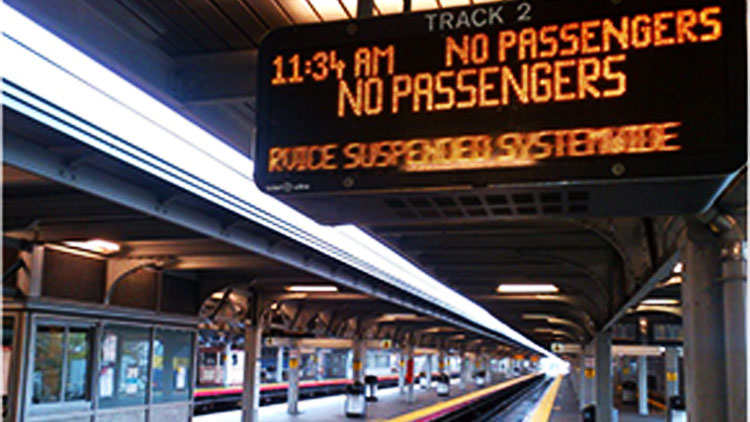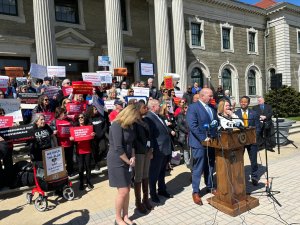Long Island Rail Road unions and MTA leaders reached a tentative contract deal Thursday, less than three days before a looming strike deadline of 12:01 a.m. Sunday that had commuters stressed out about how they were going to get to work next week.
The deal gives 5,400 LIRR workers, who have been working without a contract for four years, a 17-percent wage increase over six and a half years. It also includes health care contributions for members that the Metropolitan Transportation Authority sought to help prevent a fare hike. Additional details would not be released until after the eight unions representing the workers ratify the deal next month.
“There was a high degree of agita was over the past few days,” Gov. Andrew Cuomo, who waited until Wednesday to enter the negotiations, told reporters during a news conference at his Manhattan office. “The good news there could have been a lot more agita next week.”
The news undoubtedly will provide some relief to riders of nation’s largest commuter railroad who would’ve been forced to telecommute, pack into shuttles or drive into Manhattan if railroad workers went on strike.
Before the deal was announced, both sides released competing open letters to the public this week. The MTA initiated a print and radio ad blitz defending their position. The MTA and LIRR union leaders had been calling each others demands unfair.
Then, earlier on Thursday, reports emerged that the two sides were “close” to a deal. They then returned to closed-door meetings. Before the news conference, two of the unions announced the deal on their websites.
“Both sides have compromised to reach an agreement that gives our employees the raises they deserve while also providing for the MTA’s long-term financial stability,” MTA Chairman Thomas Prendergast said.
Anthony Simon, president of the United Transportation Union, struck a similar tone that was a break from the strong rhetoric leading up to the announcement.
“Today’s agreement provides a fair and equitable contract for our existing and future employees,” he said.
If the strike had happened, it would have snarled traffic and drained an estimated $50 million daily from the local economy, according to the state comptroller’s office.
Riders were relieved to hear the news.
“The commute going in would have been ridiculous for everyone,” said Tanya Graham of Lakeview. “I would have had to work a different shift at my job and take a bus at 4 a.m.”
Others were left with a bitter taste in their mouths.
“I think both sides had held the customers and the city hostage because they know what it means to go on strike,” said Kwesi Awai of Uniondale. “I have no clue what I would do.”
Karen Simon of Garden City, who was prepared for “very long bicycle ride,” agreed.
“I think it’s a good thing because nobody would really win if there was a strike,” she said. “Management wouldn’t win, the employees wouldn’t win and the commuters wouldn’t win. It will just create a lot of hardships for everybody. The economic impact would have been horrendous for the businesses surrounding the stations. It didn’t really need to go this far.”



























